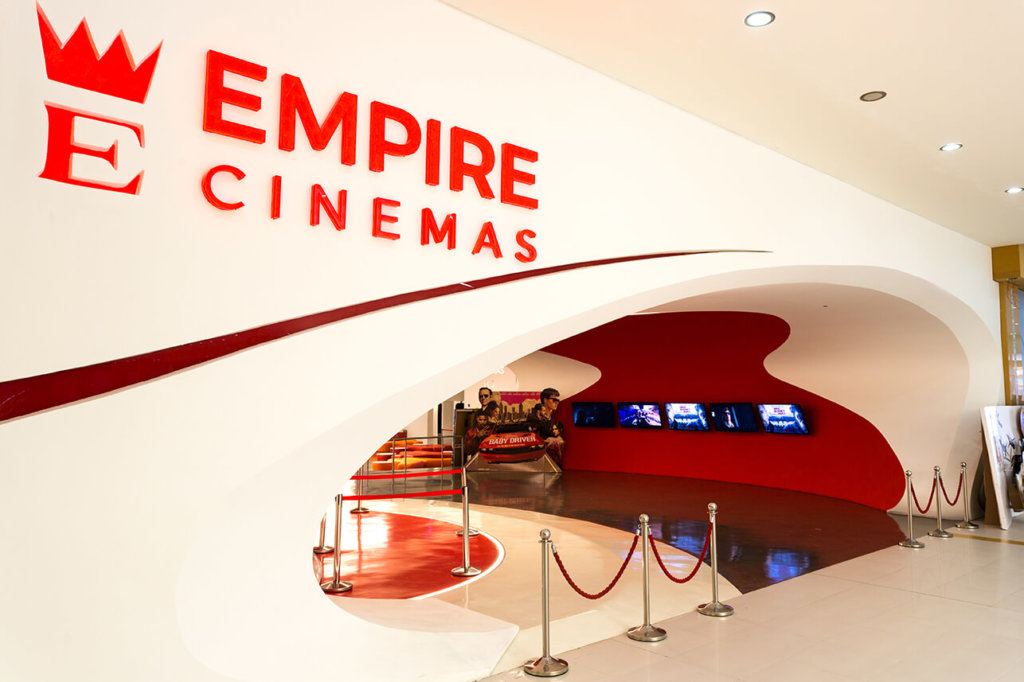Pundit of the silver screen, Mario Haddad Sr, CEO of Empire International, has dedicated his life and career to bringing cinema to the Middle East. Since taking over his father’s business in 1956, Haddad’s zeal to share his passion for film with the Arab world has persisted despite economic and political turmoil.
A testimony to his determination, Haddad built Lebanon’s first multiplex during the country’s devastating civil war, after it had destroyed the family’s downtown Beirut cinemas. Since then, his sons, Mario Jr and Gino Haddad, have joined the family business, Empire International, which has capitalised on the region’s growth market appetite for entertainment and American culture, internationalising to serve their Levantine neighbours, the GCC and beyond.
Diversification has played a significant role in Empire’s sustained success. Not only does Empire own and operate an extensive network of movie theatres, but the family business also acts as the exclusive licensees for 20th Century Fox in the Levant and Sony/Columbia Pictures in the entire Arab world. If that weren’t enough, the Haddads have bought into an eclectic range of ventures over the years in an effort to stay relevant. Their activities as Empire International exemplify their preparedness for the future.
Recently, Tharawat Magazine spoke with Mario Sr and his son Mario Jr, President of Distribution, about disruption, diversification and their love for cinema.
How did Empire International begin and how did the business navigate the turbulence of the Lebanese Civil War?
Mario Sr: In 1919, Empire was founded by my father and a partner. My brother and I took over in 1956, and when my father died, we split from his partner and divided the assets, retaining the legacy name, Empire. In 1956, cinema was the height of mass media and public entertainment. Video streaming was unimaginable. Television had come to Lebanon, but there was only one Lebanese station, and programming was mediocre at best. Until 1975, Lebanese people preferred to go to the cinema for their entertainment.
Mario Jr: In 1994, I began my work with the family business. Four years later, my brother, Gino, joined too, and this year we are celebrating our centenary.
When I was growing up, Lebanon was at war, but I don’t necessarily consider our ability to sustain success through the conflict a measure of our resiliency – escapism is a necessity in dark times – cinema always has a place in society. Finding solutions to problems, however, is part of the game. The war has ended, but the Lebanese economy is still perhaps more unpredictable than markets elsewhere. Empire’s continued profitability despite consistent struggle is a sign of our strength.
The Lebanese Civil War is a dark stain on our history. The conflict began in 1975 and ended in 1990 – 15 years of disaster. Beirut was divided and burned. Empire’s downtown theatres were razed to the ground. The war destroyed everything in its path. To reinvigorate the business, we built Espace, which was the first multiplex in Lebanon.
Mario Sr: That’s right, the Lebanese Civil War is a dark stain on our history. The conflict began in 1975 and ended in 1990 – 15 years of disaster.
Beirut was divided and burned. Empire’s downtown theatres were razed to the ground. The war destroyed everything in its path.
To reinvigorate the business, we built Espace, which was the first multiplex in Lebanon. Initially, Espace had two theatres. Almost immediately after opening, however, we decided to add another three. Despite the unrest, this period marked the first opportunity for five screens under one roof in Lebanon.
We followed that up in 1981 with Empires two and three, their naming a continuation of my father’s legacy.
How important has diversification been to Empire’s enduring success?
Mario Jr: Diversification is a significant factor in our sustainability. We currently handle two aspects of cinema: exhibition and distribution. In the US, this would violate antitrust legislation. However, in this part of the world, there are no such restrictions in place.
As such, we provide our cinemas and other cinemas with movies, and we take movies from ourselves as distributors. My brother handles the exhibition aspect of the business, operating the cinemas, and I handle distribution. My father oversees both aspects.
At one time, our distribution was limited to Lebanon because neighbouring countries didn’t have any cinemas. We branched out to Syria and Jordan in a small way, but the infrastructure wasn’t in place – theatres had only one or two screens.
In those days, there were almost no cinemas in the Gulf – Dubai and Abu Dhabi, which now account for a significant portion of our revenue, were a clean slate.
Our expansion to the Arabian Peninsula began in 1965 when my father sold nine films outright to Kuwait at US$1000 per film. The country only had one cinema at the time. To give some perspective on how much the industry has grown since then, the average film would easily gross a million dollars in today’s market.
Still, when I joined in 1994, in terms of distribution, 98 per cent of our business was domestic.
Since then, however, we’ve significantly broadened our horizons; we couldn’t rely solely on income based in Lebanon. Today, when Empire releases a picture, only 6 or 7 per cent of the profits come from Lebanon, and the remaining balance comes from across the rest of the Arab world. So, with respect to internationalisation, our model has entirely changed over the last 25 years.
How does Empire deal with industry disruption?
Mario Sr: A journalist recently asked me if I was worried about Netflix and Amazon, specifically their potential to erode our market share. Disruption, however, is nothing new – we’ve been through this before with television, VHS, DVD and piracy, but we survived.
Cinema reacted. We had colour, we had film school and we had stereophonic sound; television was lacking in comparison. Now, you can buy a TV the size of a wall and have a home theatre. Still, however, watching a movie at home is not comparable to sitting in the theatre and sharing the experience of film as a group.
Before we promote a film, I review it sitting by myself in one of our cinema halls. I don’t enjoy it nearly as much as when I see it for the second time, listening to a full house laughing through a comedy or feeling the tension in the room build throughout a thriller or drama. The emotive capacity of film is lost or at least significantly diminished when it’s experienced alone. In this respect, cinema is unique. That said, the industry has changed significantly, and not all our competitors have survived.
In the late fifties, every cinema in Beirut was owned by a family business – Empire was not unique in this respect. We were part of a cooperative community of friends.
As time went on, these other businesses either evolved or sold. They left the film industry. For us, however, perseverance paid off.
We continued, my brother Michel and me. We didn’t know how to do anything else; cinema was in our blood.
That said, we did experiment with other ventures along the way, including home video, home entertainment, the record business – everything that we felt was forward-facing. For a time, we represented all the home video companies in Lebanon. These ventures did well for us on the whole but did not compare to cinema. Along with flexibility, a certain amount of rigidity or perseverance also pays off; in business, balance is required.
In the late fifties, every cinema in Beirut was owned by a family business – Empire was not unique in this respect. We were part of a cooperative community of friends. As time went on, these other businesses either evolved or sold. They left the film industry. For us, however, perseverance paid off.
What does the future of Empire Entertainment look like?
Mario Jr: Staying relevant is our greatest challenge moving forward. When I consider how we need to adapt to consumer preferences, I think primarily in terms of distribution.
As distributors, we work with the iconic American studios. That means we’ve had to adapt. Not only do we distribute for studios, but we also represent them in our cinemas.
Films no longer use 35-millimetre reel. Production is fully digitised, which means shipment is no longer required, studios can send files directly to the cinema. Because of digitisation, the importance of the localisation aspect is dramatically reduced.
Maintaining our relevancy means considering alternate sources of revenue and listening to our customers. For instance, local content is increasingly important. So, not only are we buying independent films, we’re going into production. Empire also conducts live events and has begun exploring the gaming market.
Right now, studios are further developing their content so it can be consumed as augmented and virtual reality. Due to a lack of infrastructure, however, they aren’t profiting from these new formats yet. Nevertheless, we’ve already started outfitting our new Saudi theatres with the capability to show virtual and augmented reality content.
The goal for us is to manipulate these advances efficiently. We adapted to the proliferation of television with ever larger screens and multiplexes. Virtual reality and gaming represent the next step in the evolution of Empire.
Because entertainment trends in the Middle East are sometimes 10 to 20 years behind the rest of the world, the cinema industry here is still growing. In the US, our industry has plateaued, and as a result, they’ve been forced to evolve more quickly.
New and even untapped markets still exist for us. In Sudan, Saudi Arabia, Bahrain and Oman they are still building malls and cinemas. We anticipate another decade and a half of expansion in those markets before we feel the need to transition to new formats. Yes, it is going to happen, but the level of interest in our part of the world is increasing; the Middle East is still in love with cinema. And so are we.

